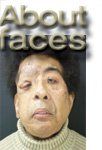- General Dermatology
- Eczema
- Chronic Hand Eczema
- Alopecia
- Aesthetics
- Vitiligo
- COVID-19
- Actinic Keratosis
- Precision Medicine and Biologics
- Rare Disease
- Wound Care
- Rosacea
- Psoriasis
- Psoriatic Arthritis
- Atopic Dermatitis
- Melasma
- NP and PA
- Skin Cancer
- Hidradenitis Suppurativa
- Drug Watch
- Pigmentary Disorders
- Acne
- Pediatric Dermatology
- Practice Management
- Prurigo Nodularis
Article
About faces: Transplant patients continue to progress
International report - Two of the world's first face transplant recipients are progressing at least as well as expected, their surgeons say.

Key Points

However, experts say that concerns about chronic rejection and the psychological impact of face transplants remain unaddressed. And two physicians who helped pioneer these procedures are questioning each others' claims of success.
Meanwhile, a University of Louisville face transplant program remains in a holding pattern, and the Cleveland Clinic's program continues screening patients and conducting immunological research. Additionally, a face transplant program based at Boston's Brigham and Women's Hospital has begun interviewing prospective recipients (see sidebar).
Furthermore, Ms. Dinoire has experienced no rejection episodes since publication of an 18-month follow-up article in which her doctors pronounced her functional, and aesthetic results satisfactory (Dubernard, et al. N Engl J Med.), he says.

Dr. Lengelé says her most serious complications have included an acute rejection episode that occurred 214 days post-transplantation.
Doctors resolved the complication with intravenous methylprednisolone and prednisone mouthwashes, plus local applications of clobetasol and tacrolimus ointments, according to the article.
Doctors handled an earlier, less severe rejection episode somewhat similarly. The report also details two infectious complications.
More importantly, Dr. Lengelé says physicians addressed a progressive decrease in the patient's renal function by switching from tacrolimus to sirolimus.
"Since the change," he says, "she has had no problems."
'Perfect' indication
Worldwide reaction to Ms. Dinoire's progress includes congratulations and concerns.

Because the dog attack that prompted Ms. Dinoire's surgery was such a well-defined trauma, he says, "The chances that the outcomes would be spectacular were pretty high. And the outcomes were spectacular. That helps the entire field to move forward, because people are optimistic about the outcomes."
Based on results of organ and hand transplants, he adds, none of Ms. Dinoire's complications were unexpected.
However, Dr. Barker says that while researchers excellently documented Ms. Dinoire's aesthetic and functional results, their article contains no quantitative measurements of the transplant's psychological impact.
"One could argue that success should not be measured solely on clinical grounds, but also by factoring in psychological acceptance of the transplant and psychological adjustment to the new face," says Karen Maschke, Ph.D., associate for ethics and science policy at the Hastings Center, a Garrison, N.Y., bioethics think tank.





